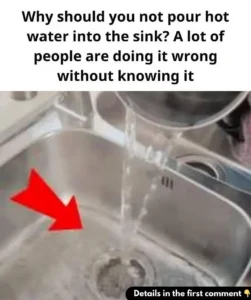Pouring hot water down the sink might seem like an innocent habit, especially when you’re washing dishes or draining leftover boiling water. However, this seemingly simple action could actually be damaging your plumbing and drainage systems, costing you money and impacting the environment. In this article, we’ll explore why you should avoid this common mistake and how to protect your home’s pipes from potential harm.
The Hidden Dangers of Pouring Hot Water Down the Drain
A lot of people believe that pouring hot water down the drain is harmless, but that’s far from the truth. Modern plumbing systems, often made from materials like PVC, aren’t designed to handle extreme heat. Over time, pouring hot water can lead to serious damage to your pipes, resulting in costly repairs.

1. Hot Water Speeds Up the Aging of Pipes
In older homes, kitchen and bathroom pipes were made of metal, which could handle high temperatures better. Nowadays, most drainage systems are made with plastic-based materials, like PVC, which are durable but not built to withstand constant exposure to hot water. Regularly pouring boiling water into these pipes accelerates the aging process, causing the plastic to degrade. Even if the damage isn’t immediately obvious, it can significantly shorten the life of your plumbing, eventually requiring expensive repairs or replacements.
2. Hot Water Can Cause Pipes to Deform or Crack
PVC pipes have a temperature tolerance limit of about 140 degrees Fahrenheit (60 degrees Celsius). Boiling water can easily exceed 190 degrees Fahrenheit, which can deform or even crack these pipes. Deformed pipes can cause significant problems, like leaks or even bursts, which are not only inconvenient but can also be very costly to fix. To protect your plumbing system, it’s important to understand the limitations of your pipes and avoid subjecting them to extreme temperatures.
How to Protect Your Drainage System
The good news is that you can easily avoid heat-related damage to your plumbing by making a few small changes. Here are some simple ways to protect your sink and drainage system:
1. Use Effective Filters for Food and Grease
Most kitchen sinks come with a basic strainer, but upgrading to a high-quality filter is one of the best ways to keep your pipes in good shape. A good filter will catch food particles and prevent grease from entering your drainage system, reducing the risk of clogs. Grease is a major culprit when it comes to blocked pipes. When hot grease cools, it solidifies and sticks to the inside of your pipes, which can cause severe clogs over time. A good trash filter can help prevent these issues and keep your pipes clean.
2. Dispose of Food Scraps Properly
It might seem easier to rinse small food scraps down the sink, but even tiny bits can build up and eventually cause major clogs. To prevent this, scrape all leftover food into the trash before washing your dishes. When food particles accumulate in your pipes, they can create bad odors and reduce water flow. Proper disposal of food scraps will save your pipes from unnecessary strain and keep your sink smelling fresh.
3. Never Pour Grease or Oil Down the Drain
One of the worst things you can do to your plumbing is to pour grease or oil down the drain. Even if it seems harmless while it’s hot and liquid, grease quickly solidifies as it cools, leading to severe clogs. Instead, let the grease cool and harden in a container, then throw it away in the trash. This simple step can prevent costly plumbing repairs and keep your drainage system functioning smoothly.
4. Regularly Clean Your Sink and Drain
Preventive maintenance is crucial for keeping your drainage system in top shape. Make it a habit to clean your sink and drain regularly using non-corrosive products. Harsh chemicals can damage your pipes over time, so opt for natural cleaners like baking soda and vinegar, which are effective at breaking down buildup without harming your plumbing. If you notice your sink is draining slowly or hear strange noises, it might be time for a thorough cleaning or a professional inspection to prevent the issue from getting worse.
Tips to Prevent Heat Damage to Your Pipes
To avoid damaging your pipes with hot water, let boiling liquids cool before pouring them into the sink. This reduces the temperature shock to your pipes and helps prevent deformation. If you absolutely need to pour hot water down the drain, run cold water at the same time to help balance the temperature.
Another great tip is to use a heat-resistant bowl or basin to pour out hot water, instead of draining it directly into the sink. This simple step can protect your pipes from direct exposure to extreme heat and help them last longer.
Conclusion: Be Mindful of What Goes Down Your Sink
Pouring hot water into the sink might seem harmless, but the long-term consequences can be far more serious than you realize. Hot water can cause irreversible damage to PVC drainage systems, leading to expensive repairs and even impacting the environment. By adopting a few simple habits—like using effective trash filters, disposing of food and grease properly, and allowing hot liquids to cool before pouring them down the drain—you can protect your plumbing and extend the lifespan of your kitchen sink.
Being mindful of what goes down your drain isn’t just about preventing clogs—it’s about preserving the integrity of your entire home’s plumbing system for years to come.